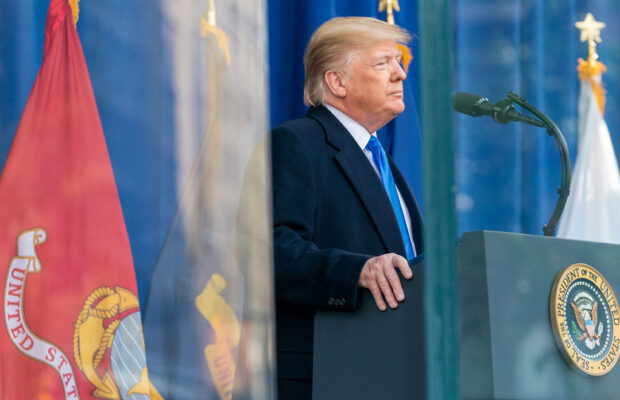President Trump implements new policies during first 30 days

Since his inauguration on Jan. 20, President Donald Trump has enacted and revoked many policies. These policies largely surround the economy, environment, education, military, foreign relations and immigration. For more information on new immigration policies and ICE raids, please visit page one.
A large topic of discussion during the 2024 election was the economy, specifically in relation to rising prices. During his campaign, President Trump announced his plans to impose higher tariffs on foreign goods. After his initial promise for these to be enacted on his first day in office, this deadline was pushed until February. On Feb. 1, Trump officially announced tariffs on goods from China, Canada and Mexico. China faced 10 percent tariffs and Canada and Mexico were given 25 percent. Two days later on Feb. 3, such tariffs placed on Canada and Mexico were delayed. On Feb. 4, all deliveries to and from China and Hong Kong were halted, however, on Feb. 5 this decision was reversed. Finally, though he has yet to raise tariffs on European imports, Trump has made it clear that he is willing to do so.
Another one of Trump’s first orders was the withdrawal from the Paris Climate Agreement, an international treaty aiming to strengthen the global response to climate change. Another environment-related order signed on Jan. 20 was the declaration of a ‘national energy emergency.’ The declaration means that authorities throughout the West Coast, Northeast of the United States and Alaska are meant to identify and develop plans to utilize any available energy resources. Trump also signed for the instruction of federal agencies to end subsidies for electric vehicles and placed a 60-day pause upon all approvals for renewable energy development on private lands. In addition, on Feb. 11, the president began to roll back requirements of businesses that call for them to disclose their impact on climate.
In terms of education, the president has ordered for public school funding to be refunded, rolled back protections surrounding LGBTQ students, and ended the order from the Biden administration that surrounded the investigation of book bans. This means that any further investigations into schools that remove books from their libraries would cease.
On his first day in office, the president froze foreign aid and moved to withdraw from the World Health Organization. Since these first foreign relations orders, he has threatened to cut off aid to South Africa, which he has since enacted, offered Ukraine assistance in exchange for rare-earth minerals and announced a nearly 7.5 billion dollar arms deal with Israel. He also has proposed that the United States should maintain long-term control over the Gaza Strip, involving the permanent displacement of Palestinians to Egypt and Jordan. Arab leaders are set to meet and discuss a counter to this plan. In addition, he started high-level talks surrounding ending the war in Ukraine with Russia.
Some more general policies include mass firings within the government, increasing amounts of power to Elon Musk, announcing there are only two genders and further cutting federal funding to schools that require students to be vaccinated.
In terms of Musk, Trump has granted him the title of head of the Department of Government Efficiency and “special government employee,” meaning he is meant to serve as a consultant to the legislative branch for a short period of time. This grants him the powers of any other government official. However, unlike past special government employees, Musk is exercising power. Under this title he has been granted access to a Treasury Department system that contains the Social Security numbers and bank account information of Americans’.
President Trump has further plans to enact over the next four years in relation to topics that affect all American people.



